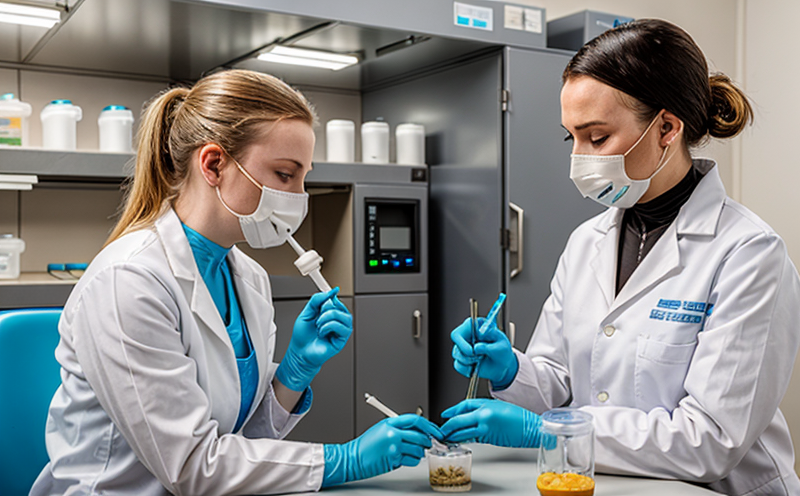EN 21055 Aflatoxin B1 Testing in Peanut Products
The European standard EN 21055 provides a robust framework for the determination of aflatoxin B1 in peanut products. This testing is essential as aflatoxins are potent toxins produced by certain molds, primarily Aspergillus flavus and Aspergillus parasiticus. These mold species can colonize peanuts during growth or storage, leading to contamination with aflatoxins. Aflatoxin B1 is known for its carcinogenic properties, making it crucial to monitor and control in food products.
The standard specifies the use of liquid chromatography-tandem mass spectrometry (LC-MS/MS) as the method of choice for accurate quantification. This approach ensures that even trace amounts of aflatoxin B1 can be detected with high sensitivity, which is critical given its low detection limits.
The testing process involves several key steps:
- Sample collection: Careful sampling to ensure a representative portion of the batch or product line.
- Sample preparation: Grinding and homogenizing the sample. Extraction using an appropriate solvent followed by clean-up procedures like solid-phase extraction (SPE).
- Analytical determination: Injection into the LC-MS/MS system for separation, detection, and quantification of aflatoxin B1.
The standard also outlines acceptance criteria where results below a specified limit are considered compliant. This limit is based on international guidelines such as those set by the World Health Organization (WHO) and the European Food Safety Authority (EFSA).
Compliance with EN 21055 ensures that products meet regulatory requirements, thereby protecting public health and maintaining consumer trust.
Benefits
- Achieves regulatory compliance with international standards like EN 21055 and WHO guidelines.
- Ensures product safety by detecting aflatoxin B1 at trace levels.
- Promotes brand reputation and consumer trust through consistent quality assurance.
- Reduces the risk of health issues associated with aflatoxin exposure.
- Averts potential legal consequences from non-compliance.
Customer Impact and Satisfaction
- Enhanced product safety for consumers.
- Increased brand reputation and customer loyalty.
- Maintains regulatory compliance, reducing the risk of recalls and fines.
- Promotes sustainable practices by ensuring clean products.
Satisfied customers trust in your commitment to quality and safety. This not only leads to repeat business but also expands market reach through positive reviews and recommendations.
International Acceptance and Recognition
The European standard EN 21055 is widely accepted across Europe, aligning with international guidelines from organizations like the WHO and EFSA. This ensures that testing results are recognized globally, facilitating trade between different regions.
Adherence to this standard demonstrates a commitment to high-quality food safety practices, which is increasingly important in an interconnected global market. Compliance also opens doors for export opportunities by meeting stringent import standards of various countries.





